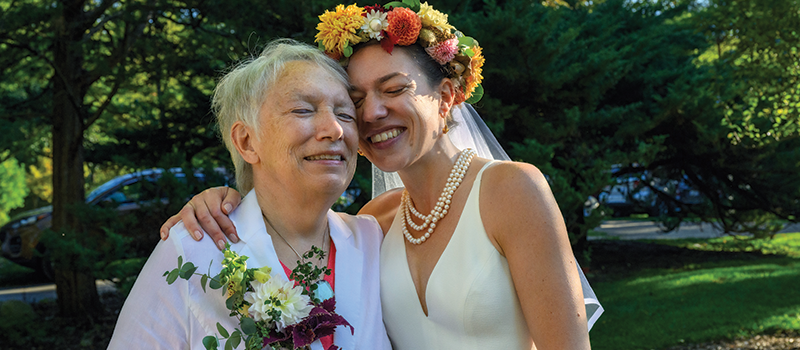Thrown into Cancer Land
by Jeanne Hodesh as told to Mary Clare Fischer
How a caregiver has navigated supporting her mother during brain cancer treatment.

Photo courtesy Jeanne Hodesh
We took my mother to the emergency room in May 2022, two days after her 75th birthday. It was the worst day of my life.
This was after about four days of realizing something was off. My dad and I took her to her primary care doctor, who was pretty dismissive. So we went to the ER.
All day long, different doctors came in, and the various assessments escalated up until about 4 p.m., when they called in the neurosurgery department. That’s when they told us she had a glioblastoma, a brain tumor.
It was this beautiful time of year. All the dogwood trees were blooming. It felt so unfair and otherworldly. I was just struck with grief.
So far, my family had managed to avoid cancer. I was struck by how big, unfortunately, this community is, and that you're just thrown into cancer land, where no one wants to be, and there's a lot to learn.
My parents don’t understand patient portals very well, and hospitals are complicated to navigate. My mom couldn't feed herself at first, and she was so confused about what was happening to her. So the caretaking was enormous, and to balance that with your own grief is quite extreme.
Before her surgery, I sent an email to 12 close family friends and relatives and made a couple of calls. I realized for me what would be helpful is to rally this team together and know they were thinking of us.
I’ve written plenty of sympathy cards over the years, but when people say, “I’m thinking of you. I'm holding you in my thoughts,” it meant so much more than I ever imagined.
That first night home, with this crazy regimen of pills, I got them all lined up, and I knew which one she was supposed to take and when. But she was looking at every pill bottle and trying to sound out the words on them. It reminded me of when my grandmother had dementia. The loop was really short.
And then there were home care visits — physical therapy and occupational therapy and speech therapy. So there was a lot of scheduling.
I started to hear from friends how important it was to advocate for ourselves. Someone suggested getting a second opinion.
We had a Zoom with Dr. Daniel Wahl, who would become her radiation oncologist at Rogel. He was just great. He listened. He took her seriously. He answered her questions and didn't mind re-explaining.
We got off the Zoom, and she turned to me and said, “I want him to be my doctor.” I started crying. It was like a kid picking which college they want to go to. That’s the one I wanted for her.
In early June, we started going to Rogel to do her radiation treatment. Her chemotherapy and clinical trial drugs started at the same time.
Obviously, no one wants to spend their summer going to radiation every day. But I was so relieved that she was with us. I wanted to spend time with her, and this was just the activity we were doing.
The biggest challenge was paying attention to the idea that I was in charge, but she wanted to take care of herself. I was able to cede that control back in tiny increments. It was hard for me, but it was important to her and her healing.
In the beginning, I had all the doctors call my number, but we eventually got it switched back, so her number is the primary one for people to call. She started keeping track of all her appointments, all her medications and just running with it.
I began to feel calmer and came back to myself as the months went on. Eventually she started being able to take walks, which is something we always did together before. We would go short distances, and then we went farther and farther, and now we’re back to our old long walk.
Two months before we took her to the ER, my husband and I had gotten engaged.
The wedding was in the backyard of my parents’ house on Oct. 1. The timing was great because by then my mom was getting better and more independent.
It felt so significant to have her there — and to have her fully there. She read an original poem. She wasn't diminished.
As much as I was proud to celebrate our union, I was also proud to show off how far my mom had come. The whole thing went from being extremely scary to her being more empowered and thriving in a way. I can't remember when I've seen her like this.
Her attitude has made it easy for the rest of the family to take a breath. This traumatic thing happened, but we're getting through it, and there are surprises along the way that you would never expect. A lot of people who have cared for aging and dying parents have said, “I’m so sorry, it's going to be really hard, but it will also be incredibly beautiful in ways you never could imagine.” And that is 100% true.
Resources:
To learn more about brain tumors, please visit Rogel’s neuro-oncology program.
